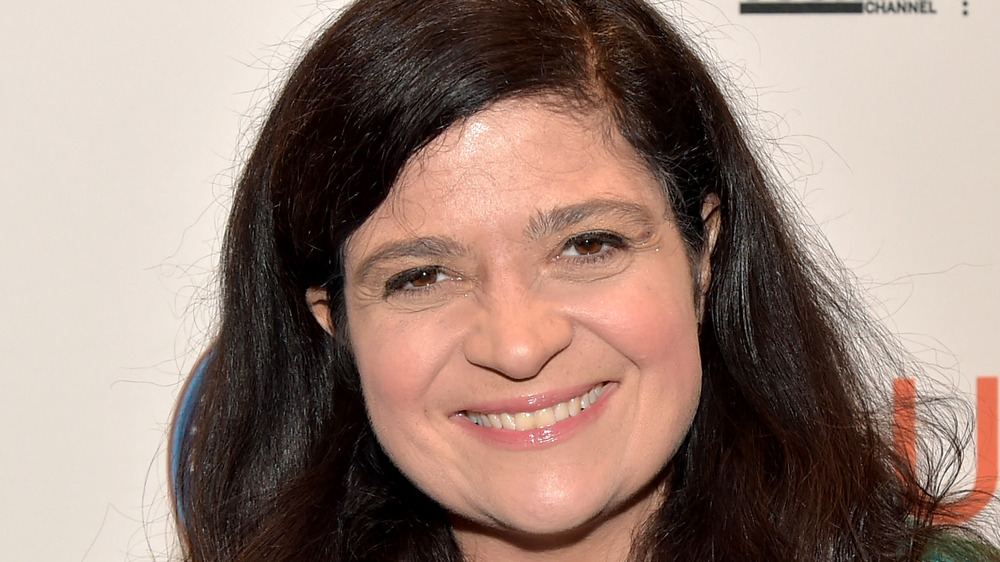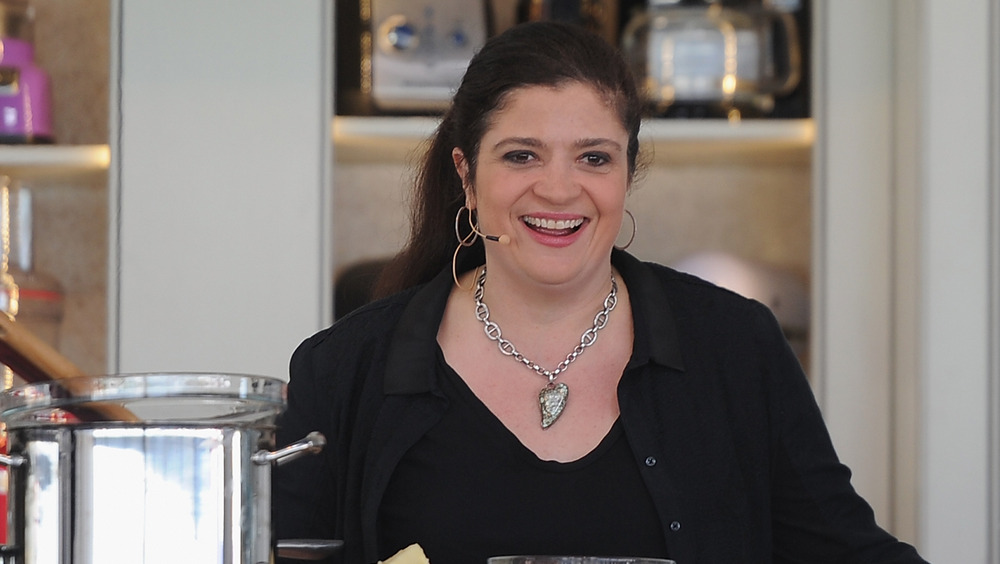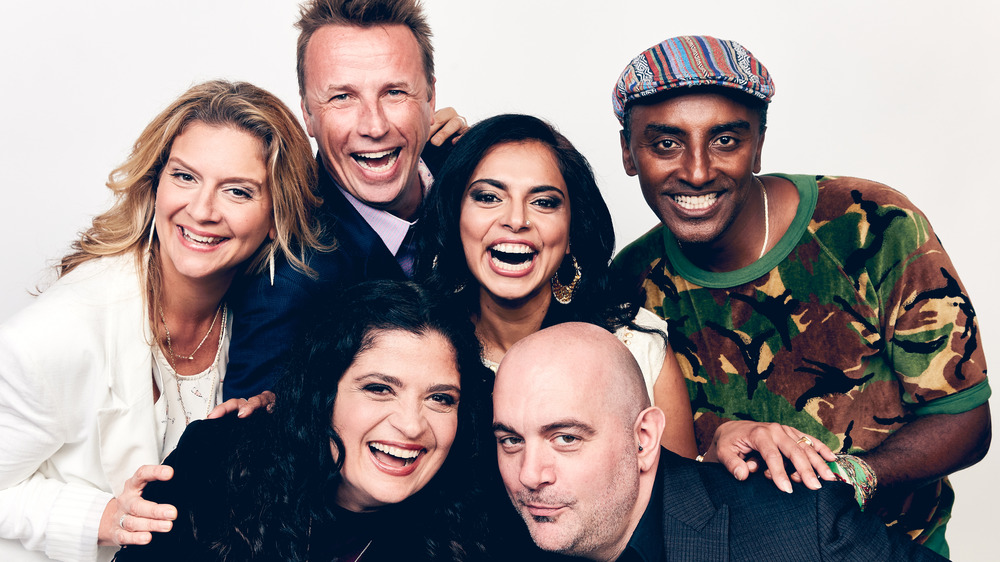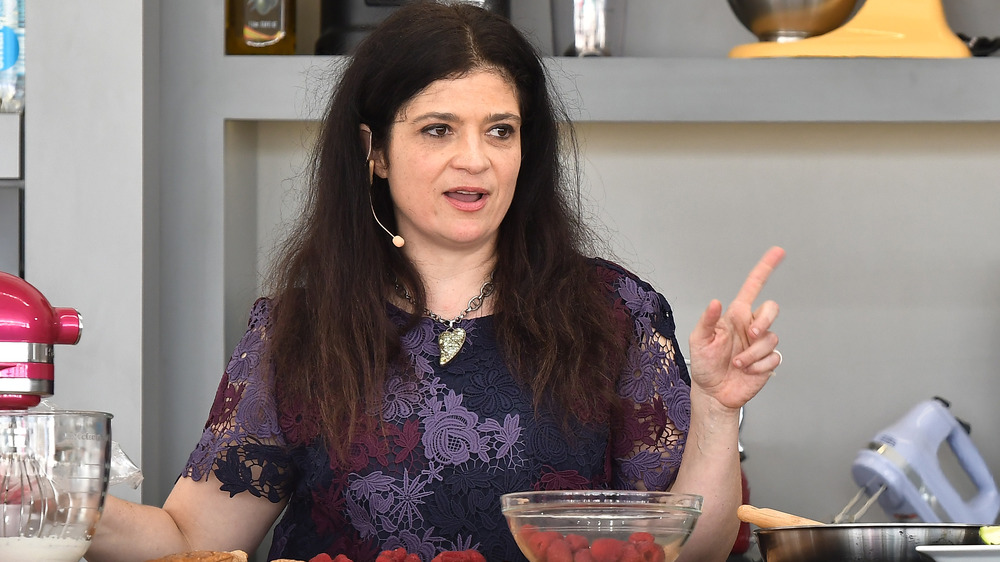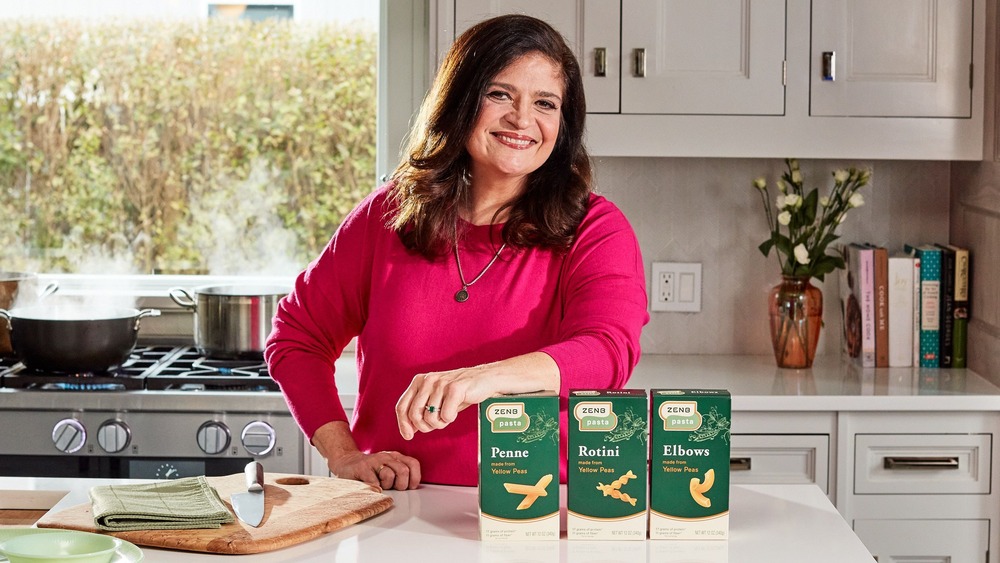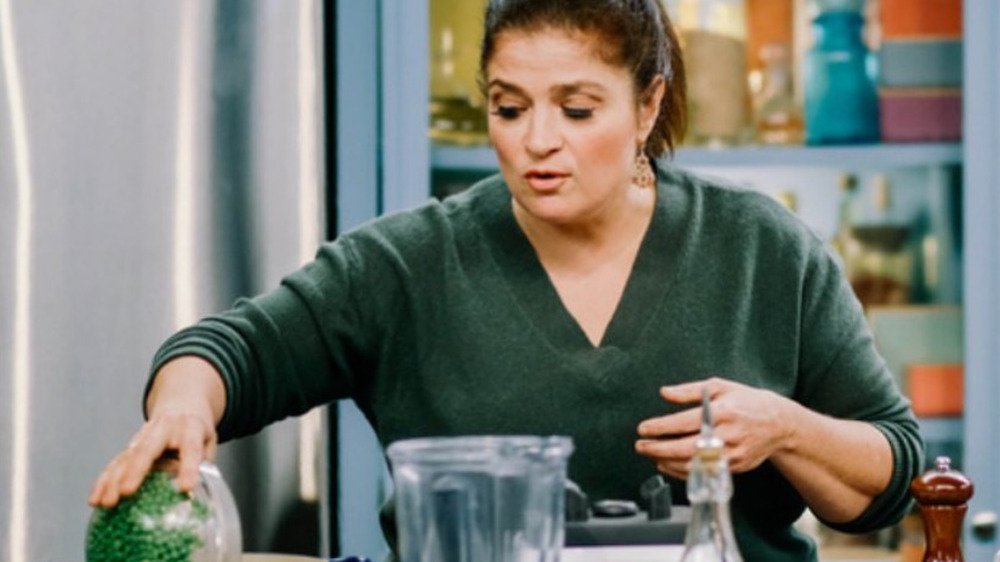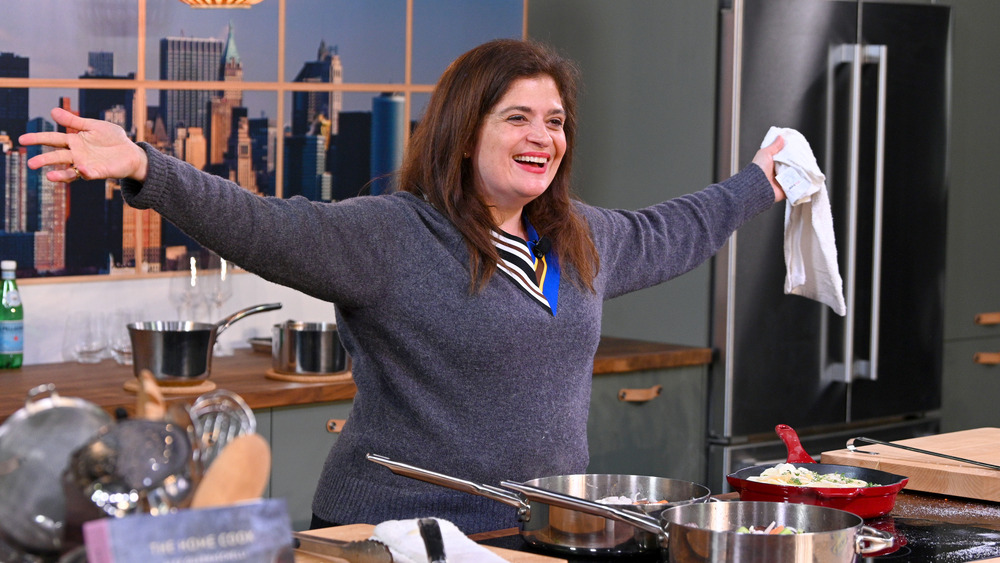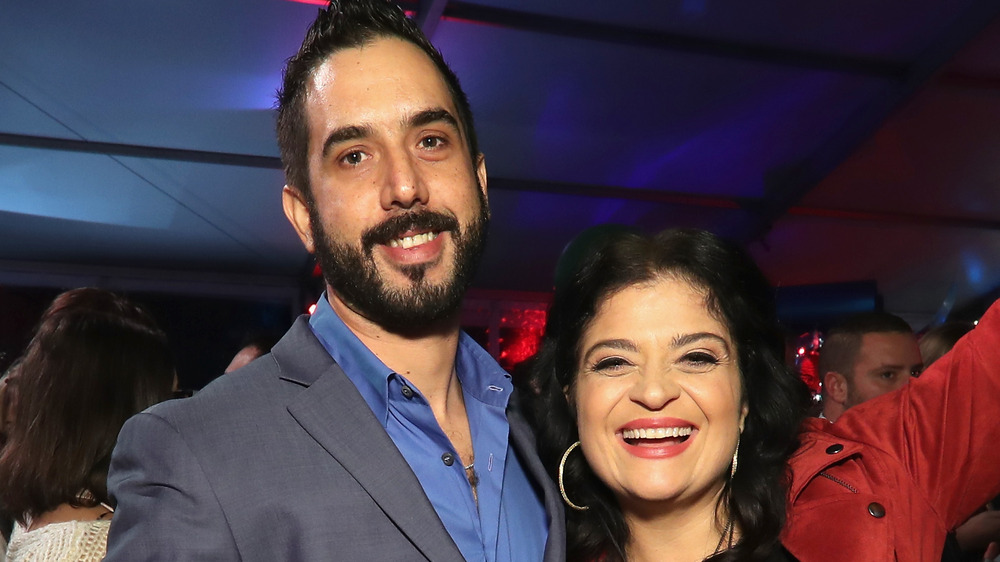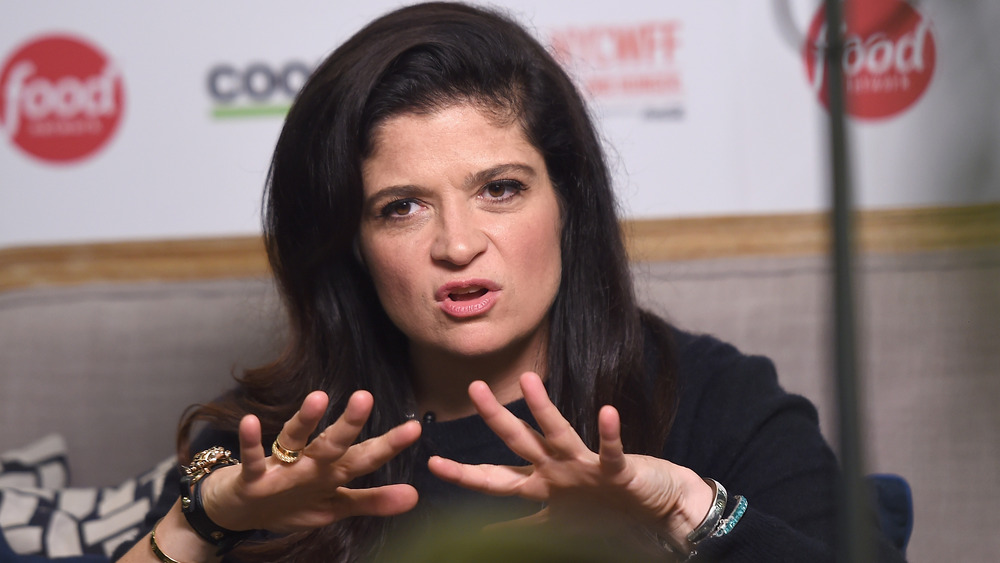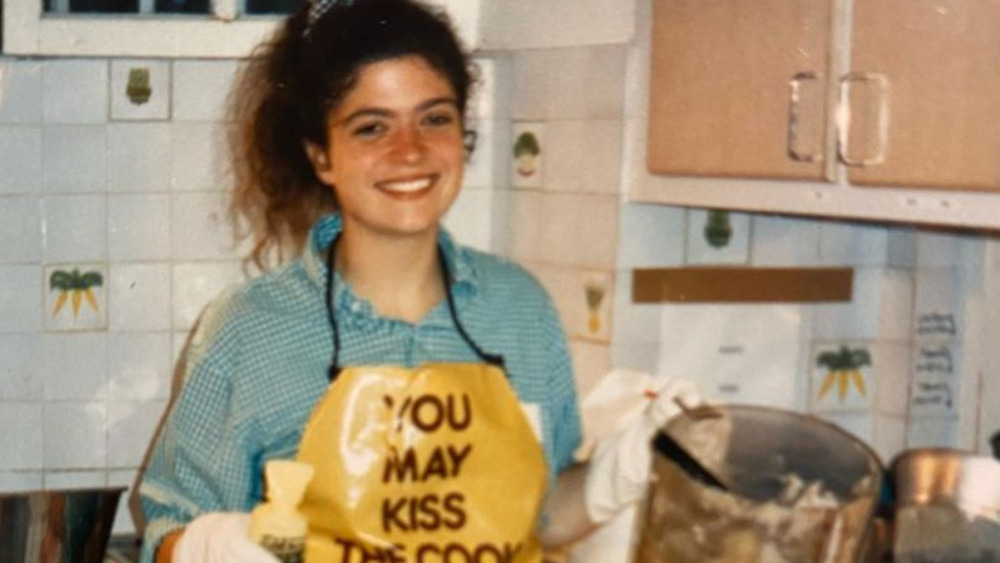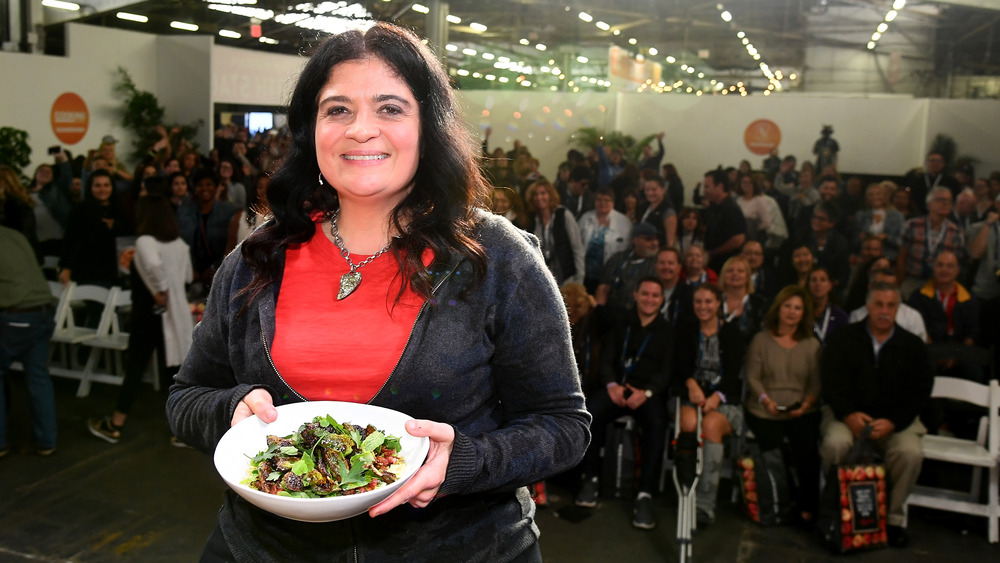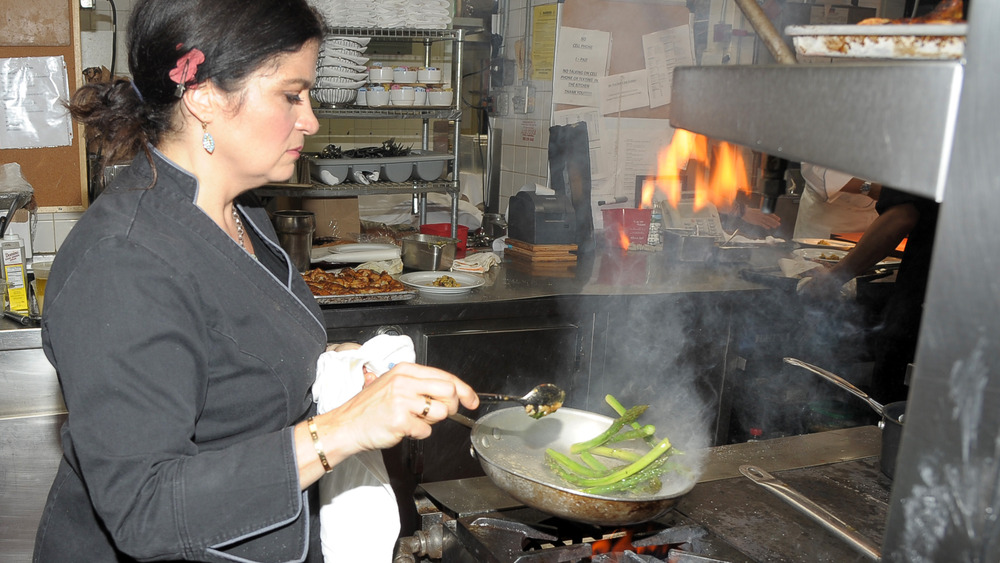Alex Guarnaschelli Talks Plant-Based Pasta, Cooking Show Disasters, And The Best Advice She's Never Given - Exclusive Interview
In 2006, the executive chef of New York City's Butter restaurant, Alex Guarnaschelli, was invited to compete against three other chefs on Food Network Challenge to see who could whip up the best Thanksgiving dinner in a mere five hours. It was Guarnaschelli's first appearance on the Food Network. While she didn't exactly win that one, the producers knew a natural when they saw one, and Guarnaschelli has been appearing all over the Food Network ever since — both as a competitor (she's now an Iron Chef, in fact), judge, and host. Although she met her fiancé, Chef Michael Castellon, over a steak that he cooked (to perfection, apparently) at his restaurant, Guarnaschelli considers herself a "closet vegetarian." She's even partnered with plant-based pasta brand, ZENB, with whom she's been coming up with a series of recipes that highlight the 100 percent yellow-pea pasta's gluten-free goodness.
After trying ZENB for ourselves and finding it surprisingly al dente and quite delicious, we needed to know more. Luckily, Chef Alex Guarnaschelli made herself available for an exclusive interview with Mashed, one which ended up covering not just ZENB but everything from college majors to confidence to kohlrabi, with some very useful relationship advice thrown in for good measure.
The first time Alex Guarnaschelli appeared on Food Network, it was a bit of a disaster
In 2019, Variety estimated you'd appeared more than 600 times on Food Network. What would you say it is now?
I genuinely have no idea. Maybe that's part of my charm, or maybe I'm an idiot — or maybe both.
What happened on your first appearance on the Food Network?
I was on a competition show with three other chefs. We had five hours to make Thanksgiving dinner. The show shot in Denver, which affected the cooking because of the altitude. I was boiling potatoes in water to make mashed potatoes and they literally just never cooked. I could have baked potatoes or done any number of other things, but I was so inexperienced, really, because it was my first time cooking food on TV. I remember thinking, "Oh, god. I didn't win, so I'm never going to be on TV again — because if you don't win, you don't get to be on TV." That's what I thought. But the producer was like, "You're pretty good at this. You're funny, you're kind of wacky," and this and that. And I'm like, "Okay, great, but I just lost." But that was the beginning. Little did I know, right? That would be the beginning of quite a lot of TV.
Not to mention a lot of cooking competitions. What are some of the ones you feel you got the most out of?
I'm an Iron Chef, so I won the show, The Next Iron Chef, and the prize was that I got to come on Iron Chef and then defend my title. So I did a lot of cooking on that show, Iron Chef America. And those are definitely my favorites. I've been on Chopped, as well, but more as a judge than a challenger, although I've been both. And those are probably my two favorites, although I do love me some Grocery Games. You know Guy Fieri's show? And I love Beat Bobby Flay. So I've done a lot of competition cooking. I think it's nice to test your ability against your peers. I think it's good for your own confidence to put yourself to the test.
I've heard you say competitions can get "emotional." Can you elaborate on that?
I don't know a competition that doesn't — because whatever part you have in that "play," someone is doing some serious learning about themselves. If you're watching as a judge, you're learning about how other people think when they cook food. If you're competing, you're learning about yourself and what you can do under pressure. When you win, it's great validation. If you don't win, but you still learn a lot about yourself. There's a lot of different ways that it's rewarding and a lot of different ways that it's just hard. And a byproduct of that experience is always emotion, whether we're talking about crying or elation or euphoria or disappointment, or excitement.
Alex Guarnaschelli on the stuff viewers don't get to see on Food Network cooking competitions
What about the stuff on Chopped that happens that ends up getting cut from the final broadcast, you know, the wacky things that the viewers don't get to see?
Outtakes? I think part of the reason why these competitions resonate so much with people is because the viewer gets to see pretty much everything that happens. Every time I go on set, I say to myself, "What more can happen here?" Have we not seen it all? Someone cuts their finger, someone drops their food on the floor, someone forgets half the ingredients. What's left to see?"
I remember the last time I said that, I walked on set and actually said to the producer, "What more can happen here? We've seen every variation possible on a scene." And the producer was like, "I know, right? What's left?"
So 20 minutes later, the competition starts, and one of the contestants is cooking. and they have a towel on the side of the stove — which happens. But a tiny edge of it caught fire, which also happens. It's near the burner or whatever and you're not aware. So they threw it in the garbage, like, "Well, let me get it out of the way." And I swear, two minutes later, the whole garbage can puffed up in a flame of smoke. It honestly looked like we rigged it. It was so unbelievable. The garbage can just erupted in flames. And I kind of remember, just kind of slow-motion turning my head and looking over at that producer and the producer slow-motion looking over at me and she's like, "It's never going to end." It's unbelievable. I think that really resonates with people because it's real.
So, then, did that end up on TV?
I don't know that I've seen that episode. I don't always get to watch all of them. And sometimes we film a dozen episodes within, say, a 30-day period and they get stacked in my brain. And then I don't always remember, but I'm sure it is. Oh, come on. I mean, who would want to leave out a flaming garbage can? That's awesome.
Alex Guarnaschelli explains what she means by "survival type" cooking
I've heard you say your least favorite part of cooking is the cleanup?
Don't get me wrong, I'll go in the kitchen and I'll make three sinks worth of dishes to make a pie, but on the days when I just want to cook up a good dish and eat a meal, a function of "survival type" cooking, then it's not just thinking about the ingredients, which are obviously the most important thing, but also a little bit of mindfulness towards, "Gee, do I need six bowls and five pans or can I do this more simply?" Some recipes are more elaborate because they're worth it. Sometimes you just have to have those simpler dishes.
Any simple dishes in particular that lend themselves to this "survival type" cooking?
I think pasta is always a great way to get to a really satisfying meal quickly and easily.
Speaking of pasta, I know you've been collaborating with ZENB, a Japanese-inspired food brand that makes gluten-free pasta from nothing but peas. How does plant-based pasta fit in with your cooking ethos?
If it can be plant-based, and I can make a healthy choice that doesn't feel like a compromise, then it's not like I wish I was having flour-and-egg-filled pasta. I'm having the ZENB because actually, I like it. And it's going to be simple. That's a win, win ... win.
What's the best but the absolute simplest way you've managed to use ZENB pasta so far?
I actually dumped a bunch of the elbows into a chicken soup at the end of cooking it. I made the whole soup and then I threw a handful of the elbows into the hot soup on the stove and just cooked it for seven, eight minutes, shut the heat off and let it sit, and the pasta was perfect. And I was like, "Oh, my god."
How Alex Guarnaschelli came to collaborate with ZENB plant-based pastas
How did you come to work with ZENB?
I got the pasta in the mail before I had any idea it would lead to a brand partnership. That's important because then it just becomes an ingredient sitting in my kitchen. I said to my fiancé, "Let's cook some of this up and eat it for dinner." I boiled a pot of water, salted it, dropped the pasta in the water, stirred it, and let it cook. I said to myself, "I'm only giving myself the time it takes this pasta to cook to make the sauce and finish the dish."
I put a pan on the stove, melted a little bit of butter, grabbed some herbs, some lemon, some parsley – literally what I had in the fridge — and some lemon. I love a little acid with pasta. We eat so much tomato sauce and what we don't talk enough about is how much we love that punchy acidity that tomatoes have. That's what we really love more than the sweetness. So I took butter and lemon, but not a lot of butter — I wanted it to be light, and some herbs. Then I drained the pasta right out of the pot, and I scooped the pasta and put it right into the pan of sauce and let it sit for a few minutes while we poured a glass of white wine and set the table in our pathetic little way. Then I loosened it with a little bit of pasta water. And the pasta is made from 100 percent yellow peas, so it has that starchiness, but a cleaner, lighter starch. We liked it. It was delicious.
But more importantly, I used two pots — a pot to boil water and pasta, which was easy to wash, and I used a pan and a spoon.
Right! We'd been talking about dishes that don't require a ton of cleanup. But now I'm wondering how the ZENB pasta held up to all that?
I mean, it's pasta made from one ingredient. Think about it for a second. One-hundred percent yellow peas. It's amazing, and it's an amazing product. It really is, but for me, it was not just the taste, which is obviously the most important thing. Does it taste good? Do I want to eat it? It's got to be al dente and not fall apart. It's got to feel like a true pasta experience for me. And that's what actually impressed me just as much. The texture really helps and I love that.
You can't do that with most gluten-free pasta. So, does ZENB make any long noodles, like spaghetti?
They haven't told me. But I was thinking, "Wow, I'd love a bucatini," like a bucapeani made from pure peas. I'm going to have to tell them that they can't call it bucatini. They're going to have to call it "bucapeani."
Alex Guarnaschelli confesses she's got a bit of an obsession with this kind of food
I understand that when you met your fiancé, it was over a steak that he happened to have cooked, and since you also just now talked about putting butter in your pasta — which I have nothing against because I'm totally into dairy — I was just wondering, where does plant-based eating fit in?
Well, if you look at my Instagram, you'll actually see that I'm obsessed with produce and that, basically, I cook and buy and eat and explore produce galore. I am a closet vegetarian who occasionally eats chicken and occasionally eats steak.
Yes! I saw today you posted about kohlrabi ...
Yeah, randomly. I mean, I was just thinking when you said that, "Oh, my god, I put up kohlrabi this morning." So I'm really a lot about vegetables and produce and plants. I'm into plant-based plants. So plant-based foods really, I think, fits seamlessly into my personal interests. And my restaurant, Butter, which I've had for 20 years, has always been about seasonal produce and ingredients. And not like a bale of hay and a list of 5,000 farmers. We don't hit you over the head with it. It's just what we do at the restaurant. And I think that, if you know me, you know that I love plants and I like to eat them.
What do you use kohlrabi for?
I like kohlrabi raw or cooked, honestly. That particular kohlrabi that I showed today — kossak – it's a particular variety. I like the gilfeather kohlrabi a lot, too. Those are probably my two favorite types and they're actually quite different, but I like to peel it. It's got a thick skin, meaning I peel it once, sometimes I even go around and give it another peel. And what you end up with is sort of, I think, like if a turnip and a rutabaga, and an apple, and a radish all had a party together and ended up putting 25 percent of each other in the pot and mixed it all together.
What do you plan on preparing the kossak kohlrabi?
I like it chopped up, raw. I like it with a lot with apples, I like it a lot with horseradish, a nice punchy flavor like that because it has a radish-y, mustardy note, but I also like it just chopped up, peeled, and then roasted in the oven, eaten like that. You can slow cook it on the stove or in the slow cooker and puree it. You can make a root vegetable stew. You can make a soup with it. You can make just a puree. I love it just as a puree. It's so clean. It's very clean, and yet it has a lot of its personality. It's not boring and it has to be good for you.
Alex Guarnaschelli reveals the one thing she wishes every Chopped contestant would bring with them on the show
When you've been a judge on Chopped, are there any mistakes you see contestants making again and again so that you're like "No, don't make me watch this again!"
I mean, yes, there are hundreds, but mostly I would just say it's hard when you watch someone and they don't have confidence in themselves. Most of it is that you just want everybody to be confident and enjoy the process of competing. And that's not possible. It's a wish, but it's not always possible. You know what I mean?
It's funny because I would think that anybody who goes on television to cook on TV would have to have some measure of confidence. So, how does it reveal itself when a contestant isn't confident?
I think, mostly, they question themselves, they question their choices, or they forget one of the ingredients that they're supposed to use or the time gets away from them. I think a lot of those different things. One of the contributing factors can be not enough confidence. I mean, other than being under pressure and whatever.
So is the key for a contestant to kind of block out that negative, critical voice in their head and proceed like you're just doing your thing, not being watched by a whole crew?
Competition shows are messy. It's just complicated and it varies from person to person and ingredient to ingredient. it's always a new day. It's like trying to predict what the ocean's going to do.
Alex Guarnaschelli has some really astute advice for career-minded couples
Your fiancé, Chef Mike Castellon, was a contestant on Chopped in 2017, which is after you two were already dating ... so I would imagine you must have had some amazing advice for him before he went on a TV cooking competition. Can you tell us what you told him?
I didn't give him any advice.
Really?
Yeah. It was too close. We don't mix like that. You know what I'm saying? When I met him, he had already applied to go on [Chopped]. And when they accepted him, I said, "I'm not going to say a word," and he said, "I don't want you to." We wanted to keep our relationship separate. And he went on, and he competed and he won. I mean it. I know it sounds, like, "Oh, come on, Alex. For real?" But, if anything, I think it would've hurt our relationship. We just really wanted to protect our relationship. That was something that we truly decided on our own, early on. And it was a good move.
It's nice that he won because it was his win. And everybody was like, "Oh, did you judge?" and this and that. Of course not. If any of us knows a contestant, we can't judge them, no matter who. So some of my cooks from the restaurant went on the show. I've never been a judge on those episodes. You can't judge if you know the person.
Yeah. That seems like it wouldn't be kosher.
I would've bullied everybody into letting him win. So forget it!
Alex Guarnaschelli lets us in on how those grocery carts on Supermarket Stakeout are always so entertaining
Regarding Supermarket Stakeout, are the customers really random or do the production people go into the store and help get their carts ready?
We post that we're shooting the show so that everybody who shops at the store is made aware. So we make it public information that we're shooting this. And when you pull in the parking lot, you can see the set. You can see it. It usually eats about ... Well, I guess it depends. I mean, it eats a chunk of the parking lot.
I've heard you say you'd always want there to be eggs in the cart...
That's always the dream.
Does a dozen eggs always seem to find its way in?
There's not always eggs, unfortunately. And that's the funny thing. Especially on some things, you really want to. If it's baking, you're like, "Oh, my god. I have flour and sugar in the pantry," and if I have eggs, I can make a million things. So if someone lucks out and gets eggs, it's awesome.
And now, a quick detour to New York City in the 1990s with Alex Guarnaschelli
I understand you went to Barnard just as "foodie culture" was beginning – I know because I was a student at NYU at the time, and I remember my parents took me to Bobby Flay's Mesa Grill for some really special occasion. Do you remember any particularly influential celebrity-chef meals from those days?
I wasn't really thinking that way because I wasn't looking at food as a profession. I did a lot of cooking in college, as they say, on the cheap. It wasn't until after college when I started working at a restaurant, and then, once in awhile, I would go to a restaurant looking at it from that celebrity chef perspective. But like you, I ate at a Bobby Flay restaurant then — Bolo — and that was very memorable to me. And there used to be a Wayne Nish restaurant called La Colombe D'or that my mom would take me to.
I understand you were an art history major in college?
Correct.
But did you kinda know, going into college, that you'd eventually have a career in the culinary world? And how does the art history play a role?
I don't think my major in college has anything to do with my career choice. I think just an appreciation of artistry is what they have in common, for sure, but above and beyond that, I don't think much. I kind of graduated from college and I was like, "What do I really want to do every day? What do I want to get out of bed and do?" It wasn't really connected to my major. Sometimes I wish it was, but that just wasn't how it went with me. I have friends who graduated from college and took everything they learned with their major and it ended up being their whole life. And I'm like, "Wow, that's impressive," but for me, it really wasn't like that. I started cooking because I liked it. I enjoyed it. I liked the energy of the kitchen. I liked the work. I wanted to do it.
Was that your first job after college?
Yes. I honestly don't think, as an adult, I have not had a job that wasn't food-related, ever. Can you believe that? It's kind of weird.
So, was it like a passion that you gravitated towards?
I just liked it. Passion is a whole separate conversation because I think passion comes after you love something. I think you have to get good at it and love it and then passion comes. People talk about how they're 18 and they're passionate. For me, personally, I just don't see passion that way. For me, passion comes with experience and other things. Then passion comes. Passion is too complicated. Liking and gravitating and loving something, to me, that felt more like what it was, for me, at that age ... I was so young.
Alex Guarnaschelli is unequivocal about things she likes and things she just can't with
I know you've said that your guilty pleasure is an In-N-Out Burger. I was wondering what suffices as a substitute on the East Coast.
I don't have one, honestly. I'm an In-N-Out gal. That's something fun and recreational, but I don't know that I have equivalents all over the country, unfortunately. I just enjoy In-N-Out.
How do you feel about the vegan options for meat?
I really don't cook those things because I don't eat them. I love the ZENB stuff because it's a plant-based pasta, but I don't really deal in those. I'm more of a vegetable and plant-based type of person. So I'm not well-versed in those.
What would be your favorite way to cook ZENB?
I mean, for me, I think the best way is to cook [the pasta] and just drop it right into a beautiful sauce, And the thing I like about it is you can cook it, drop it in a sauce piping hot, let it sit a minute or two, and just dig in. So for me, they're really great for stove-top meals. I made a clam sauce that was delicious. I love a little butter and herbs, as I said. I love a tomato sauce. And I think, to that end, you could totally make very easily a vegan tomato sauce.
Can you recommend a particular combination of herbs, if I wanted to use butter?
I like parsley and basil a lot together. I also like to chop up arugula like it's an herb because it's super peppery. And I love to take that with some sweet basil, so you get peppery arugula with sweet basil. That's delicious.
That time that Alex Guarnaschelli cooked for us but didn't know it
So I know you trained under a number of iconic chefs. Did any influence the chef you are today?
Definitely. I worked for a chef in Paris named Guy Savoy. He has a restaurant in Caesar's Palace also. And he really influenced my cooking a lot.
How so?
He taught me how to cook. He taught me how to think about flavor. Taught me about flavor.
Your restaurant, Butter– is it French? Or French-influenced?
Yes. I kind of call it French American with a little bit of Italy. That's what I like to call the Butter food.
Last question: I had dinner at New York City's Daniel, where you were sous chef, on a Saturday night in 1999 or 2000. What are the odds you'd have been in the kitchen that night?
In 1999 or 2000? 100 percent.
Oh, my god. So you've cooked for me.
Amazing.
It was! And I really appreciated it.
I'm glad to get a thank you 20 years later.
You can see more of Alex Guarnaschelli on Food Network's Supermarket Stakeout and Chopped. Learn about the Japanese plant-based food brand with whom she's been collaborating, ZENB, on their website.
